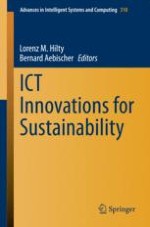2015 | OriginalPaper | Buchkapitel
Rebound Effects and ICT: A Review of the Literature
verfasst von : Cédric Gossart
Erschienen in: ICT Innovations for Sustainability
Aktivieren Sie unsere intelligente Suche, um passende Fachinhalte oder Patente zu finden.
Wählen Sie Textabschnitte aus um mit Künstlicher Intelligenz passenden Patente zu finden. powered by
Markieren Sie Textabschnitte, um KI-gestützt weitere passende Inhalte zu finden. powered by
